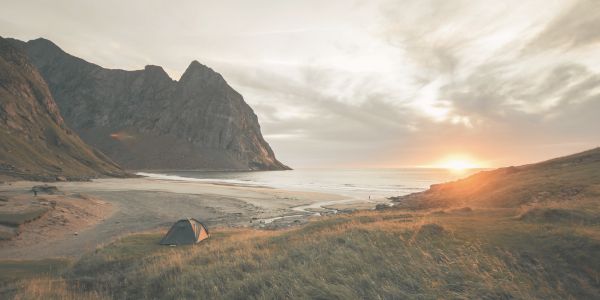Are you an adventurer looking to take your camping trip to the next level? Survivalist camping may be just what you’re looking for! Survivalist camping offers a unique and exhilarating outdoor trip by combining the pleasure of camping with survival skills.
We will delve into the realm of survivalist camping in this complete guide, offering you important tips and supplies to ensure a safe and unforgettable wilderness adventure. Let’s dive in and begin an incredible adventure in the wilderness!
Camping season is a special time for those who like the great outdoors. It helps children to connect with nature and make memories that will last a lifetime. But when exactly does the camping season begin? The answer is contingent on where you reside and your camping preferences.
Survivalist camping links us with our basic impulses, where the rustle of leaves replaces the buzz of gadgets and self-reliance becomes the ultimate currency. Whether you’re a seasoned outdoor enthusiast or a first-timer looking for a one-of-a-kind experience.
Where nature serves as your instructor and the vast outdoors serves as your playground. Prepare to enjoy the freedom, difficulties, and profound connection that only survivalist camping can provide.
What is Survivalist Camping?
Survivalist camping, often known as wilderness camping or bushcraft camping, is an alternative to regular camping. It entails immersing yourself in nature while relying on basic survival skills and minimum equipment.
Survivalist camping, as opposed to traditional camping outings, emphasizes self-sufficiency, ingenuity, and an appreciation for the natural world.

Basic Skills You Need for Survivalist Camping
Survival camping, also known as bushcraft or wilderness survival camping, requires a wide variety of abilities to thrive in an outdoor environment with minimal equipment.
To be successful in this difficult camping method, you must have vital abilities such as starting a fire from natural materials, shelter construction, and navigation without GPS.
Identifying edible plants and wildlife tracking, water purification, and basic first aid. In addition, it is essential to understand how to obtain and prepare food through hunting, fishing, or foraging.
Survival camping is not for the faint of heart, but with these basic skills, you can connect more deeply to nature while sharpening your self-reliance in the great outdoors.
1. Fire Starting Techniques
One of the most basic survival abilities is the ability to kindle a fire. Fire gives heat, light, and the ability to prepare food. Learn how to ignite a fire using a firestarter, flint, and steel, and ancient techniques such as the bow drill or hand drill.
2. Shelter Building
Knowing how to construct a shelter is crucial for protection against the elements. In survivalist camping, you may not have a tent readily available, so being able to build a shelter using natural materials found in the environment is essential.
3. Water Sourcing and Purification
Finding and purifying water is vital for survival. Learn how to locate water sources in the wilderness and different methods of water purification, such as boiling, filtration, and using water purification tablets.
4. Navigation
Navigating in the wilderness without relying on GPS is an important skill. Learn to use a map and compass to determine your location and navigate through unfamiliar terrain. Familiarize yourself with natural signs like the position of the sun and stars for direction.
5. Wilderness First Aid
Basic first aid skills are essential in remote locations where medical help may be far away. Take a wilderness first aid course to learn how to handle injuries, treat common ailments and deal with medical emergencies in the wild.
6. Foraging and Identifying Edible Plants
Knowing how to forage for edible plants and identify them correctly is essential for supplementing your food supply. Learn about local edible plants and their characteristics to avoid poisonous ones.
7. Hunting and Trapping
If you’re in an area where hunting and trapping are permitted and you have the necessary skills and equipment, learn how to safely hunt and trap for food. Respect local laws and regulations regarding hunting and trapping.
8. Building and Using Tools
Basic toolmaking skills are valuable in survival situations. Learn how to create tools from natural materials, such as a knife, spear, or digging stick, to aid in various tasks.
9. Knot Tying
Learn a variety of useful knots for different purposes, such as securing shelters, building traps, and creating useful tools.
10. Improvisation and Adaptability
Survivalist camping requires quick thinking and adaptability to changing circumstances. Be willing to improvise and use available resources creatively.
Remember that practicing these skills in a controlled environment before venturing into the wilderness is essential for building confidence and competence. Additionally, always prioritize safety and follow local regulations and Leave No Trace principles during your survivalist camping endeavors.

Packing the Right Gear
While survivalist camping emphasizes minimalism, packing the right gear is essential for your safety and comfort. Here’s a list of essential gear for your survivalist camping adventure:
- Backpack
- Tent or Tarp
- Sleeping Bag and Mat
- Multi-Tool
- Firestarter
- mosquito repellent
- Water Container
- Cooking Equipment
- First Aid Kit
- Headlamp or Flashlight
- Navigation Tools
- Food and Snacks
- Clothing
- Portable Solar Panels
Why Do People Go Survivalist Camping?
People go survivalist camping for various reasons, as it offers a unique and thrilling outdoor experience that goes beyond traditional camping. Here are some of the main reasons why individuals choose survivalist camping:
Challenge and Adventure
Survivalist camping presents a significant challenge and adventure for outdoor enthusiasts. It pushes individuals to test their physical and mental limits, providing a sense of accomplishment and fulfillment in overcoming obstacles in the wilderness.
Self-Sufficiency and Independence
Survivalist camping emphasizes self-sufficiency and independence. It allows individuals to rely on their skills and resourcefulness rather than modern amenities and technology, fostering a deeper connection with nature and personal capabilities.
Connection with Nature
Survivalist camping provides a profound connection with the natural world. Being immersed in the wilderness allows campers to appreciate the beauty of nature, the importance of conservation, and the interdependence of all living beings.
Escape from Civilization
For some, survivalist camping offers an escape from the hustle and bustle of city life and modern society. It provides an opportunity to disconnect from screens, noise, and distractions, allowing individuals to find solitude and peace in the wilderness.
Building Survival Skills
Survivalist camping is an ideal setting to develop and refine essential survival skills. Participants can learn fire starting, shelter building, navigation, foraging, and other skills that may be crucial in emergency situations.
Bonding and Team Building
Survivalist camping can be a bonding experience for friends, family members, or team members. It fosters teamwork, trust, and communication as individuals work together to navigate challenges and achieve common goals.
Primal Connection
For some, survivalist camping taps into a primal connection with our ancestors who lived close to nature and relied on survival skills for daily life. Engaging in these activities can evoke a sense of ancient heritage and nostalgia.
Personal Growth and Resilience
Survivalist camping offers opportunities for personal growth and resilience. Facing and overcoming adversity in the wilderness can lead to increased self-confidence, adaptability, and mental toughness.
Learning Resourcefulness
Survivalist camping teaches individuals to be resourceful with limited supplies and tools. It encourages creativity and problem-solving in using natural resources to meet basic needs.
Preparing for Emergencies
Some people engage in survivalist camping as a way to prepare for emergencies or unexpected situations. The skills and knowledge gained during such experiences can be valuable in real-life crises.

Choosing the Right Location
Selecting the right location for your survivalist camping adventure is essential for a safe and enjoyable experience. Choosing the right location for survivalist camping is crucial for a safe and enjoyable wilderness experience. The right location can significantly impact your ability to practice survival skills, access essential resources, and ensure your overall well-being. Consider the following factors when choosing a camping site:
1. Regulations and Permits
Check the local regulations and requirements for camping in the area. Some wilderness areas may require permits or have specific rules regarding camping and fire usage. Ensure you are aware of and comply with all the rules and regulations.
2. Accessibility
Consider the accessibility of the location. Evaluate the distance from the nearest trailhead or road and assess the difficulty of the trail or route to the camping site. Choose a location that matches your skill level and physical abilities.
3. Terrain and Environment
Familiarize yourself with the terrain and environment of the chosen location. Research the type of landscape, vegetation, and climate you can expect. Be prepared for challenges such as rough terrain, dense vegetation, or extreme weather conditions.
4. Water Sources
Ensure there are reliable water sources near your camping site. Access to water is essential for survival. Consider the availability of freshwater streams, rivers, or lakes in the area.
5. Wildlife Presence
Research the wildlife in the region and be aware of potential encounters with animals. Take necessary precautions, such as storing food securely and making noise to alert wildlife of your presence.
6. Safety Considerations
Evaluate the safety aspects of the location. Be aware of potential hazards such as avalanches, rockfalls, or flash floods. Choose a camping site that is away from hazardous areas and provides suitable protection from natural elements.
Practice Leave No Trace Principles
Practicing Leave No Trace principles is essential for responsible outdoor enthusiasts, including survivalist campers. Leave No Trace is a set of guidelines that promote environmentally conscious behavior to minimize human impact on natural areas and preserve the wilderness for future generations. Here are the seven Leave No Trace principles and how to apply them during survivalist camping:

1. Plan Ahead and Prepare
Before embarking on your survivalist camping trip, research the area you’ll be visiting and plan accordingly. Obtain any necessary permits and familiarize yourself with the local regulations and rules. Prepare by learning and honing your survival skills and ensure you have the appropriate gear for the environment and weather conditions.
2. Travel and Camp on Durable Surfaces
In survivalist camping, focus on using established trails and camping in designated areas whenever possible. Avoid trampling on vegetation or disturbing sensitive habitats. If you need to camp off-trail, choose durable surfaces such as rock, gravel, or sand to minimize your impact.
3. Dispose of Waste Properly
Pack out all trash and waste, including food scraps and packaging. Do not bury trash or leave it behind. Use established restroom facilities when available, or follow proper techniques for disposing of human waste if necessary.
4. Leave What You Find
Respect the natural environment and leave everything as you find it. Avoid picking flowers, disturbing wildlife, or removing rocks, plants, or artifacts from their natural setting. Take only photographs and memories, leaving no trace of your presence.
5. Minimize Campfire Impact
In survivalist camping, consider alternatives to building a campfire unless it’s essential for survival. Use a lightweight camping stove for cooking instead. If you must build a fire, do so in established fire rings or on bare mineral soil to prevent damage to the surrounding vegetation.
6. Respect Wildlife
Observe wildlife from a distance and avoid approaching or feeding them. Keep food securely stored to prevent attracting animals to your campsite. Respect their natural behavior and habitat, and never approach or disturb nesting areas.

FAQs
1. What gear do I need for survivalist camping?
While survivalist camping emphasizes minimalism, some essential gear includes a backpack, tent or tarp for shelter, sleeping bag and mat, multi-tool, firestarter, water container, cooking equipment, first aid kit, headlamp or flashlight, navigation tools, and appropriate clothing.
2. How do I choose the right location for survivalist camping?
When choosing a camping site, consider regulations and permits, accessibility, terrain and environment, water sources, and wildlife presence. Ensure the location aligns with your skill level and experience.
3. Is survivalist camping safe for beginners?
Survivalist camping can be challenging, especially for beginners. It’s essential to have basic outdoor skills, knowledge of the area, and appropriate gear. Starting with car camping or camping in established campgrounds can be a good way for beginners to gain experience before venturing into more remote wilderness areas.
4. Can I practice survivalist camping alone?
While some experienced campers may prefer solo survivalist camping, it is generally recommended to practice camping with a partner or in a group, especially for beginners. Having someone else with you enhances safety and provides support in case of emergencies.
Conclusion
Survivalist camping is an adventure like no other, offering an opportunity to connect with nature, test your survival skills, and experience the wilderness in its raw form. By mastering essential survival skills, packing the right gear, choosing suitable camping locations, and following Leave No Trace principles, you can embark on a thrilling camping journey.
Remember, safety should always be your top priority during survivalist camping. Always inform someone of your plans and expected return date, and be prepared for unexpected situations.
You’ll find a connection to nature and yourself that’s sometimes elusive in the contemporary world when the ashes of your campfire crackle in the solitude of the forest and the night sky shines with its celestial splendor. Survivalist camping, with its vital principles and carefully selected gear, is more than just a fun hobby; it’s a meaningful opportunity to reconnect with nature and reignite your basic impulses. This trip serves as a reminder that we still have the wisdom and resilience to live and flourish in nature inside us. So go ahead and explore this enthralling world, where survivalist camping is more than just a hobby – it’s a trip that changes your connection with the great outdoors and with yourself.

